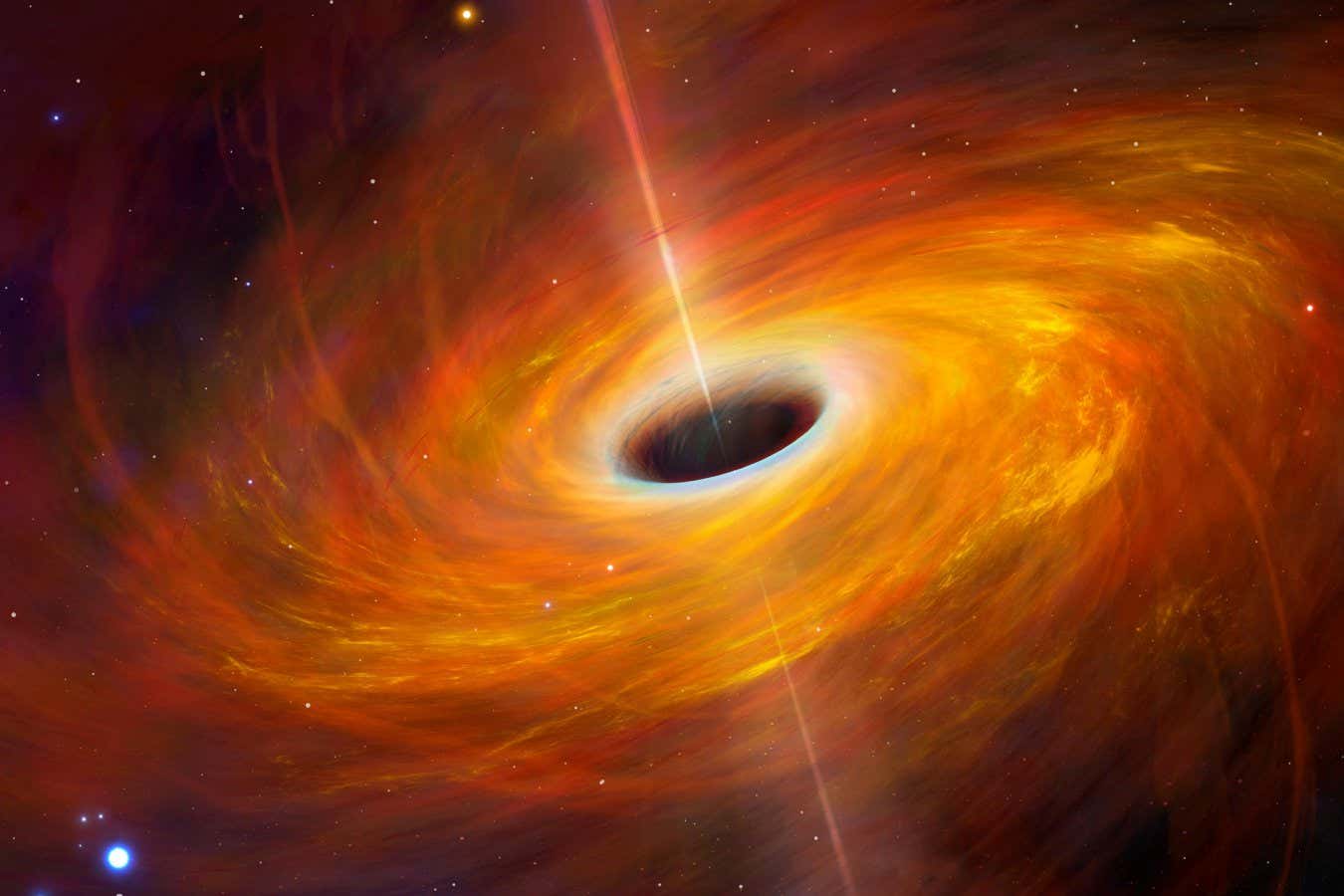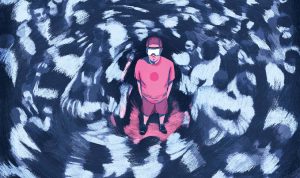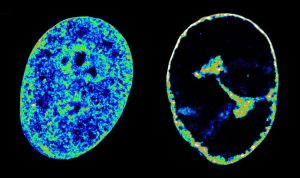The author of Lake of Darkness, the latest read for the New Scientist Book Club, on why, in a world awash with fictional dystopias, he set out to write the opposite
Adam Roberts’ Lake of Darkness opens as two space ships investigate a black holeScience Photo Library / Alamy Stock Photo
Adam Roberts’ Lake of Darkness opens as two space ships investigate a black hole
Science Photo Library / Alamy Stock Photo
The starting point for this novel was that I wanted to write utopian fiction. I hadn’t done this before: all my previous novels have been straight science fiction. But utopia, the genre that imagines a better, or a perfect, world, is older than science fiction: the first utopian novel, the work that coined the term, was written by Thomas More all the way back in 1516.
I was interested in what happened to the mode: More’sUtopiagenerated lots of imitators. Through the 17th and 18thcenturies,a great many utopian books, novels, tracts and treatises were written. It was a major genre in the 19th century and into the 20th:Erewhon(1872) by Samuel Butler; William Morris’sNews from Nowhere(1892), H. G. Wells’sA Modern Utopia(1905), B. F. Skinner’sWalden Two(1948). Consider Edward Bellamy’sLooking Backward(1888), one of the most impactful novels ever published in the US: a huge bestseller, it led to the creation of hundreds of “Bellamy Clubs” across that country and the founding of a Nationalist Party to run for the US presidency, with the aim of actualising Bellamy’s utopia there.
But nowadays? Nobody really does utopia. Instead we are absolutely awash with dystopias, versions of the worst, not the best, possible future:TheHunger Games,The Road,Divergent,TheMaze Runner, various Cyberpunk hellscapes,Battle Royale,Oryx and Crake, a great dismal river of books and films and video games. It’s an interesting question as to why utopia has gone out of fashion, and why dystopia is now so popular. Why has it gone out of fashion?
Read moreThe best science fiction novels to look forward to in 2025
The best science fiction novels to look forward to in 2025
One answer might be that utopia is unstoryable. When my creative students come to me with their premises for writing, their brilliant science fiction conceits and imagined worlds, I ask them: in this idea, where is the conflict? Because: no conflict, no drama; no drama, no story. Writing the perfect utopia is hard because there can be, by definition, no conflict in the perfect realm. I said nobody writes utopia nowadays and you might object: what about Iain M. Banks’sCultureseries? Isn’t that a utopian space? But actually Banks rarely explores that, because the radical happiness of Culture life isn’t conducive to story: instead Banks’s novels are about the Culture’s dangerous secret-service organisation, Special Circumstances, which goes into all manner of non-utopian worlds and alien species where they can have adventures. In my novel it is likewise: in order for there to be a story, for characters to have adventures, I take them out of the comforts of utopia, confront them with horrors, dangers, monsters.
Rereading the best science fiction writers of all time: Iain M. BanksAt his best, Iain M. Banks could be extraordinarily stylish, inventive and downright funny. So how does his genre-redefining science fiction stand up to the test of time? Emily H. Wilson rereads the greats
Rereading the best science fiction writers of all time: Iain M. Banks
At his best, Iain M. Banks could be extraordinarily stylish, inventive and downright funny. So how does his genre-redefining science fiction stand up to the test of time? Emily H. Wilson rereads the greats
Join us in reading and discussing the best new science and science fiction books
But I wanted to do more than this: I wanted to investigate the logic of utopia itself. Is utopia possible? Not “can the world be a little better?” – obviously it can – but could we reorganise society so as to perfect it, to make a utopia?
Some years ago, I was invited to give the keynote at the Utopiales conference, an event that takes place at various locations around Europe every year. The year I went it was in Tarragona, a beautiful place in Spain. I gave my keynote, the nub of which was: utopia as a mode can’t evade the crunch point of human nature. Some utopias are authoritarian (Thomas More’s original utopia is this, for instance) where structures of authority and force compel the utopian citizens to live in harmony. Others are bottom-up, predicated on the notion that if this or that material or psychological impediment were removed, human beings would just naturally live together in bliss. I must say: I don’t think either of these are viable, practically speaking. As literary critic John Carey puts it, what all utopias share is the desire “to a greater or lesser extent, to eliminate real people”.
This bold, experimental slice of deep-space sci-fi is just brilliantIn Adam Roberts's Lake of Darkness, two spaceships meet to study a black hole. Their research comes to an abrupt halt, however, when crew members start dying horribly, says Emily H. Wilson
This bold, experimental slice of deep-space sci-fi is just brilliant
In Adam Roberts's Lake of Darkness, two spaceships meet to study a black hole. Their research comes to an abrupt halt, however, when crew members start dying horribly, says Emily H. Wilson
In my Utopiales keynote I argued that the most convincing utopia in culture is the TV showTeletubbies. These beings (I’m not sure what they are: posthuman genetically altered cyborgs perhaps), these ’tubbies, do live according to utopian principles, but only because they are little children. Their needs are easily catered for, they are easily distracted and entertained, they are happy in their world. Adults would find Teletubbyland a frustrating and terrible place to live: monotonous, understimulating, restrictive. My argument, in other words, was that there is something radically infantilising about utopia as a concept, something puerile in the strict sense of the word. After the lecture there was a reception, and I wandered around the venue with a glass of wine in my hand chatting to people. Some attendees chatted with me about my talk, but there were a number of people there who “cut” me, literally turned their back to me as I approached. I was puzzled by this, until the conference organiser explained: Utopiales attracts scholars and academics interested in literary and cultural representations of utopia, but it also attracts actual utopians, people who plan to make utopia a reality: as it might be, wealthy American businessmen who, having made their fortune, have retired and plan to buy land and construct a utopian community. These people thought I was mocking them with my keynote. They were angry with me.
Well, I’m sorry they thought I was insulting them. But I stand by my view, and inLake of DarknessI apply social theory, imagined space opera technology and a series of particular characters and situation to the idea of utopia according to that view.
Adam Roberts’sLake of Darkness(Gollancz)is the latest pick for the New Scientist Book Club. Sign up and read along with ushere.
Explore the world of science fiction and learn how to craft your own captivating sci-fi tales on this immersive weekend break, with author Adam Roberts.Read more
Explore the world of science fiction and learn how to craft your own captivating sci-fi tales on this immersive weekend break, with author Adam Roberts.
Receive a weekly dose of discovery in your inbox!
We'll also keep you up to date withNew Scientistevents and special offers.
















